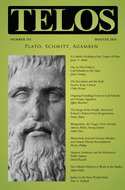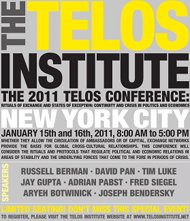By Telos Press · Tuesday, October 23, 2012 The New York Times recently published a letter from Telos Editorial Associate Marcia Pally, who commends the paper for drawing attention to the work of “new evangelicals”:
Molly Worthen’s insightful review of “Moral Minority: The Evangelical Left in an Age of Conservatism,” by David R. Swartz (Sept. 30), is, I hope, the beginning of more coverage of the evangelicals who have left the right. Swartz’s fine scholarship illuminates a critical shift in our religio-political landscape: “new evangelical” activism in environmental protection, economic justice and immigration reform — a big change in where evangelical time and money are going. If we don’t read about changes like this, we accept old prejudices and remain blind to political realities.
Continue reading →
By Marcia Pally · Tuesday, February 7, 2012 Marcia Pally’s “Non-Market Motives at Work in the Market: ‘New Evangelicals’ in Civil Society in the United States and Overseas” appears in Telos 157 (Winter 2011). Read the full version online at the TELOS Online website, or purchase a print copy of the issue here.
 Since the 2008 global financial crisis, a reassessment of our global market system seems to be afoot: if neoliberalism (too much market) yields the Great Recession, if socialist planned markets (not enough market) produce the failed economies of the former Soviet bloc, and if social-market combinations (too much market centralization) progress toward the high-cost and slow growth of Western Europe, what are better options? This essay describes the economic justice efforts of “new evangelicals,” those who have left the right for an anti-consumerist, anti-militarist focus on economic justice, environmental protection, immigration reform, and racial/religious reconciliation. It reviews the history of U.S. evangelicalism, describes the current shift away from the religious right, and details “new evangelical” common-good capitalism, where the benefits of capitalist markets are preserved yet embedded in—and constrained by—common-good values. This is not alms-giving but the restructuring of opportunity for those whom the market has failed—not an undoing of market relations but a radical change of relations within the market. The undergirding religious doctrines and case studies, both domestic and overseas, are described. Against the view that linking markets to common-good principles is romantic or useless, “new evangelicals” are already on the ground, doing just this sort of linking. Since the 2008 global financial crisis, a reassessment of our global market system seems to be afoot: if neoliberalism (too much market) yields the Great Recession, if socialist planned markets (not enough market) produce the failed economies of the former Soviet bloc, and if social-market combinations (too much market centralization) progress toward the high-cost and slow growth of Western Europe, what are better options? This essay describes the economic justice efforts of “new evangelicals,” those who have left the right for an anti-consumerist, anti-militarist focus on economic justice, environmental protection, immigration reform, and racial/religious reconciliation. It reviews the history of U.S. evangelicalism, describes the current shift away from the religious right, and details “new evangelical” common-good capitalism, where the benefits of capitalist markets are preserved yet embedded in—and constrained by—common-good values. This is not alms-giving but the restructuring of opportunity for those whom the market has failed—not an undoing of market relations but a radical change of relations within the market. The undergirding religious doctrines and case studies, both domestic and overseas, are described. Against the view that linking markets to common-good principles is romantic or useless, “new evangelicals” are already on the ground, doing just this sort of linking.
Continue reading →
By Marcia Pally · Tuesday, February 8, 2011 An earlier version of this essay was presented at the 2011 Telos Conference, “Rituals of Exchange and States of Exception: Continuity and Crisis in Politics and Economics.”
 In light of the 2008 global financial crisis, a reassessment of the global market system seems to be afoot. If neoliberalism (too much market) yields the Great Recession, if socialist planning (not enough market) produced the failed economies of the former Soviet bloc, and if social-market combinations (too much centralization of the market) progress towards the slow economic growth and high-cost programs of Western Europe, what are better options? In light of the 2008 global financial crisis, a reassessment of the global market system seems to be afoot. If neoliberalism (too much market) yields the Great Recession, if socialist planning (not enough market) produced the failed economies of the former Soviet bloc, and if social-market combinations (too much centralization of the market) progress towards the slow economic growth and high-cost programs of Western Europe, what are better options?
“New evangelicals,”[1] perhaps unexpectedly for non-believers, offer a few ideas—interesting for their mix of market and common-good positions, and for an apparent paradox. “New evangelicals” work with a sophisticated notion of the common good—though their beliefs and practices rely on the very eighteenth-century principles that fostered unregulated market development. That is, they uphold unencumbered entrepreneurialism in markets, but this commitment makes them entrepreneurs for the benefit of others. This becomes more interesting when one considers that the “new evangelical” paradox has significant effect on the circulation of money and people worldwide. The material here is taken from field research that I did between 2005 and 2010 and which will appear in a book later in 2011 (Eerdmans Publishing).
Continue reading →
|
|
 Since the 2008 global financial crisis, a reassessment of our global market system seems to be afoot: if neoliberalism (too much market) yields the Great Recession, if socialist planned markets (not enough market) produce the failed economies of the former Soviet bloc, and if social-market combinations (too much market centralization) progress toward the high-cost and slow growth of Western Europe, what are better options? This essay describes the economic justice efforts of “new evangelicals,” those who have left the right for an anti-consumerist, anti-militarist focus on economic justice, environmental protection, immigration reform, and racial/religious reconciliation. It reviews the history of U.S. evangelicalism, describes the current shift away from the religious right, and details “new evangelical” common-good capitalism, where the benefits of capitalist markets are preserved yet embedded in—and constrained by—common-good values. This is not alms-giving but the restructuring of opportunity for those whom the market has failed—not an undoing of market relations but a radical change of relations within the market. The undergirding religious doctrines and case studies, both domestic and overseas, are described. Against the view that linking markets to common-good principles is romantic or useless, “new evangelicals” are already on the ground, doing just this sort of linking.
Since the 2008 global financial crisis, a reassessment of our global market system seems to be afoot: if neoliberalism (too much market) yields the Great Recession, if socialist planned markets (not enough market) produce the failed economies of the former Soviet bloc, and if social-market combinations (too much market centralization) progress toward the high-cost and slow growth of Western Europe, what are better options? This essay describes the economic justice efforts of “new evangelicals,” those who have left the right for an anti-consumerist, anti-militarist focus on economic justice, environmental protection, immigration reform, and racial/religious reconciliation. It reviews the history of U.S. evangelicalism, describes the current shift away from the religious right, and details “new evangelical” common-good capitalism, where the benefits of capitalist markets are preserved yet embedded in—and constrained by—common-good values. This is not alms-giving but the restructuring of opportunity for those whom the market has failed—not an undoing of market relations but a radical change of relations within the market. The undergirding religious doctrines and case studies, both domestic and overseas, are described. Against the view that linking markets to common-good principles is romantic or useless, “new evangelicals” are already on the ground, doing just this sort of linking.  In light of the 2008 global financial crisis, a reassessment of the global market system seems to be afoot. If neoliberalism (too much market) yields the Great Recession, if socialist planning (not enough market) produced the failed economies of the former Soviet bloc, and if social-market combinations (too much centralization of the market) progress towards the slow economic growth and high-cost programs of Western Europe, what are better options?
In light of the 2008 global financial crisis, a reassessment of the global market system seems to be afoot. If neoliberalism (too much market) yields the Great Recession, if socialist planning (not enough market) produced the failed economies of the former Soviet bloc, and if social-market combinations (too much centralization of the market) progress towards the slow economic growth and high-cost programs of Western Europe, what are better options? 






